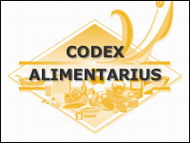
Dr. Rima explains what Codex Alimentarius is, where it came from, and what it is doing.
Part Two
And so they created a trade commision. That's a very important pair of words. A trade commission, called the Codex Alimentarius Commission. It is not a public health commission. It is not a consumer protection commission. It is a trade commission. Trade is about what? Money. Business trade is about profit.
Well, they said in 1962, were going to work toward total global implementation of Codex Alimentarius on December 31st, 2009. Long term. And they set up a bunch of commitees. Committees on fish and fisheries, fats and oil, fruits and vegetables, ground nuts, nutrition and foods for special dietary uses, and so on. There are currently about 27 Codex committees. There are regional organizations; there are task forces, and so on. So it is a huge bureaucratic monstrosity. It's immense.
Codex has promulgated well over 4000 guideline standards and regulations. On everything. Everything which can legally be put into your mouth with the exception of pharmaceuticals they are not part of Codex. Important.
Now Codex standards have no legal weight whatsoever, zero. So who cares about them they're just standards. So were talking about an industry dominated regulation setting organization, but if it has no legal standing who cares?
Right?
Here's the history of Codex Alimentarius, before 1962 the Austro-Hungarian Empire said we need rules by which the courts can rule on cases involving food. So we'll have regulations and rules that the courts will enforce. That's how they get their way. That was called the Codex Alimentarius Austriacus and it was put in to place around 1893 and lasted until the end of the Austro-Hungarian Empire in first world war.
So the idea was there in the germanic tradition. We need rules, lots of rules. Lots and lots of rules. We need a lot of rules. Let's have rules for everything to do with food.
So it was sort of a natural extension for the german industrialists to say we'll go back to the good old days of the Codex Alimentarius Austriacus, back when we had them in the Austro-Hungarian Empire, cool.
So they started promulgating their rules and regulations and they were voluntary. They were sort of guidelines. Now Codex Alimentarius Commission is administered by the World Health Organization. WHO and the FAO, the Food and Agricultural Organization, they fund Codex and they run it at the request of the UN.
So they're mommy and daddy to Codex Alimentarius. That's very interesting, because they're supposed to be about health and food worldwide. Some conflicts of interest that we'll talk about.
So Codex started promulgating regulations and rules. And the way that's done; is the committees work up a rule, standard, guideline, or regulation and then they get it to what is called step 8. Which is the final step in their administrative process and then it's presented to the Codex Alimentarius Commission for ratification. Like the vitamin and mineral guideline was presented to the Codex Alimentarius Commission on July 4, this past summer [2005]. It was ratified. It was approved by consensus. And it is now, despite the propaganda that you're going to hear if you ever hear about it in the media, it is now mandatory upon any member country of the WTO, the World Trade Organization.
Well, what in the world do they have to do with it? And the answer is everything. The World Trade Organization you see accepted Codex when the World Trade Organization was formed in 1994. Okay. They said well how are we going to decide trade disputes around food, if we don't have a set of rules. I know we'll accept the Codex Alimentarius and all the members of the WTO worldwide will...And get ready for an Orwellian term...HARM-onize, with our standards with the Codex standards. I suggest you capitalize the first four letters in your mind.
So everybody's supposed to HARM-onize with Codex. And when they HARM-onize with Codex; then if they get pulled into the World Trade Organization dispute resolution process they have a chance of winning. Because, here's the kicker, ready for this one? If two countries go into the World Trade Organization dispute resolution process and one of them is Codex compliant and one of them is not Codex compliant the one that is Codex compliant automatically wins regardless of the merit of the case.
This is the second installment of an original series from No Agenda News, read part one here.
Subscribe to No Agenda News and get the entire series and other great content
Subscribe to No Agenda News and get the entire series and other great content
.